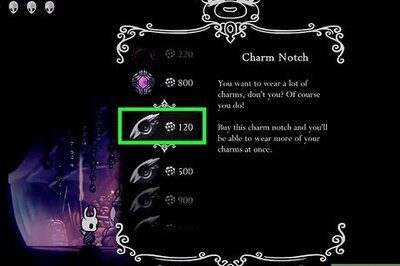
views
New Delhi: Even as it looks more or less certain that the Bharatiya Janata Party (BJP) and Shiv Sena are set to form the government in Maharashtra for a second term, one must admit that the saffron wave witnessed during the Lok Sabha elections did hit a speed-breaker in the recently concluded Maharashtra and Haryana assembly polls.
The opposition parties, for whom it was a battle for survival after the drubbing they received during the general elections, improved their performances over the previous state polls whereas the BJP-led National Democratic Alliance (NDA) ended up with fewer seats in both the states.
While the Congress more than doubled its seats in Haryana compared to 2014, its alliance with Nationalist Congress Party (NCP) gained 15 seats in Maharashtra. However, as identity politics seemed to have had taken over the politics of nationalism in these assembly polls, was it possible for the Congress-NCP combine to have secured more seats?
A News18 analysis of the election results showed that Vanchit Bahujan Aghadi (VBA), a party founded by Prakash Ambedkar, grandson of Dalit icon and social reformer BR Ambedkar, and Assaduddin Owaisi’s All India Majlis-E-Ittehadul Muslimeen (AIMIM) may have adversely affected the vote share of Congress-NCP in almost three dozen constituencies.
Although it didn’t win any seat, the VBA collected as much as 4.6 per cent vote share. The AIMIM polled 1.34 per cent of the total votes in the state. A look at the seat-wise contests showed that in at least 35 constituencies, VBA or AIMIM or both bagged more votes than the margin of victory between the NDA and the opposition’s candidate.
Among these, in at least 27 seats, which include Chalisgaon, Akola West, Osmanabad, and Jintur, the VBA and AIMIM garnered significantly more votes than the vote margin between the winning NDA candidate and Congress-NCP candidate at the second spot whereas in other eight seats either VBA or AIMIM made it to the runner-up position, pushing the opposition candidate to the third or fourth position.
For instance, in Chalisgaon, BJP’s Mangesh Ramesh Chavan secured 86,515 votes against NCP’s Deshmuck Rajiv Anil’s 82,228 while VBA collected 38,429 votes. Again, BJP’s Govardhan Mangilal Sharma bagged 73,262 votes in Akola West compared to Sajid Khan’s (Congress) 70,669 votes. VBA, on the other hand, got 20,687 votes in the same seat.
Similarly, in Pune Cantonment constituency, the BJP candidate got 52,160 votes compared to Congress’ 47,148, whereas VBA and AIMIM secured 10,026 and 6,041 votes, respectively.
Constituencies where VBA or AIMIM finished above the opposition's candidate were: Buldhana, Akot, Balapur, Murtizapur, Washim, Kalamnuri, Aurangabad Central, and Byculla.
Earlier this month, News18.com had reported that VBA could possibly hurt the Congress-NCP combine in as many as 49 assemblies constituencies if it held on to its almost seven per cent vote-share that it secured in the Lok Sabha elections. Experts believe that VBA and to some extent AIMIM, derive their voters from the traditional Congress-NCP voter-base, therefore, the two may have cut into Congress-NCP’s vote-share.
Did MNS Affect BJP-Sena’s Performance?
Raj Thackeray’s Maharashtra Navnirman Sena (MNS), though contested on more than a hundred constituencies, managed to win only one — Kalyan Rural. An understanding with the Opposition and Raj Thackeray’s mass appeal among Maratha voters in urban segments meant that the MNS was expected to eat into NDA’s vote-share in the seats that it contested.
While there were several seats where MNS may have affected NDA candidate’s vote-share, the impact was more visible and might have been decisive in at least five assembly seats.
Take, for example, Hadapsar, where BJP’s Yogesh Kundalik Tilekar lost to NCP’s Chetan Vital Tupe by 2,820 votes while MNS’s Vasant Krishna More secured a whopping 34,809 votes.
In Warora, Shiv Sena candidate Sanjay Wamanrao Deotale got 53,665 votes against Congress’ 63,862, whereas the MNS had 34,848 votes in its kitty.
Likewise, in Boisar where Shiv Sena candidate lost to Bahujan Vikas Aghadi by 2,752 votes, in Vandre East where Sena lost to Congress by 5,790 votes and in Dahanu where BJP lost to CPM by 4,707 votes, MNS secured 14,780, 10,683, and 6,332 votes, respectively.
Other Parties and Independents
Apart from almost 17 seats that Independents and other parties — out of the ambit of the two major alliances — won, they may have been a spoilsport for major parties in a number of seats.
For instance, in at least 38 constituencies, Independents and other parties got much more votes than the winning margin in that seat. These also include several seats where Independents and others secured more votes than the BJP-Sena or Congress-NCP candidate. In a majority of these seats such as Akkalkuwa, Nawapur and Raver, it was the NDA candidates who suffered as opposition candidates secured the seats.
Interestingly, in some constituencies, these Independents were the same people who have had contested under the same party’s symbol in the past which they ended up hurting in these polls. In Solapur City Central constituency, Independent candidate Kothe Mahesh Vishpnupant got 30,081 votes, while Shiv Sena candidate lost to the Congress with a 22,193 vote-margin. Incidentally, Vishpnupant had contested the 2014 assembly election from the same constituency on a Shiv Sena ticket.
Similarly, Charan Sovinda Waghmare, who had contested the previous assembly election on a BJP ticket from the same seat, received 79,490 votes in Tumsar, while the BJP candidate collected 53,733 fewer votes than the winning NCP candidate.
Even among those Independents who won their contests, some have previously been a part of major political parties. These include Mahesh Baldi, now MLA from Uran seat, who had contested and lost from the same seat on a BJP ticket in 2014 or Ravi Rana, Badnera MLA, who had his wife Navneet Rana contest the 2014 Lok Sabha elections in Amravati under the NCP symbol. Badnera falls in the Amravati Parliamentary constituency.




















Comments
0 comment